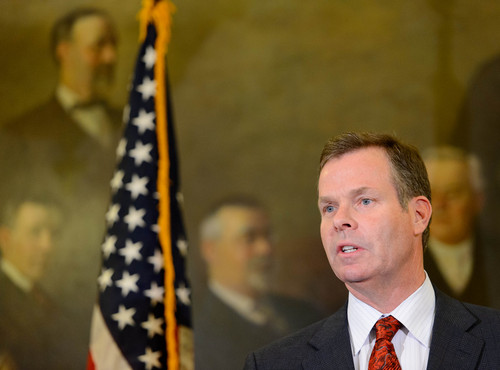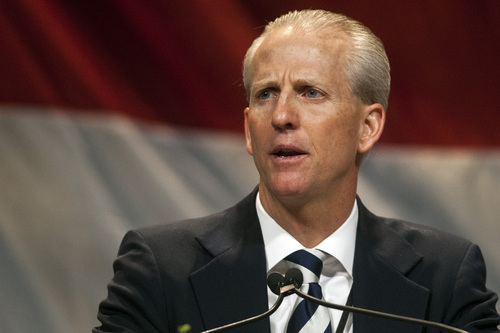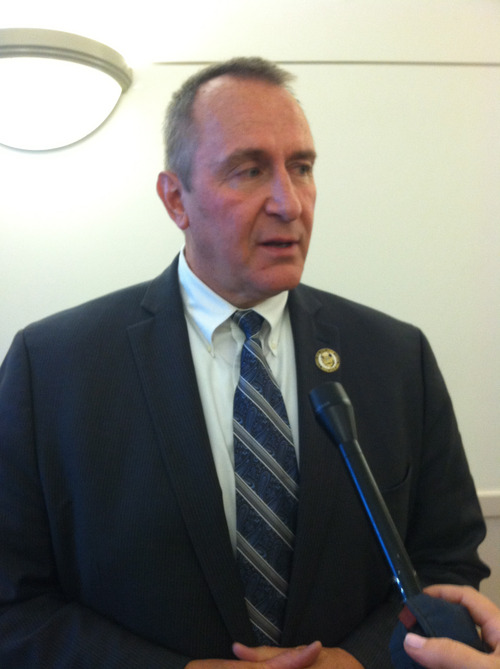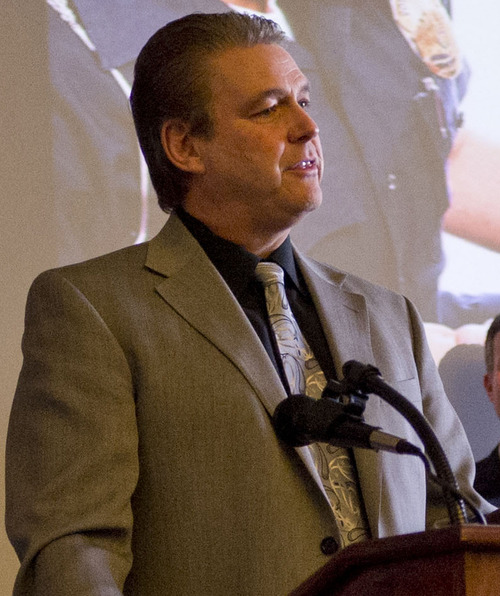This is an archived article that was published on sltrib.com in 2014, and information in the article may be outdated. It is provided only for personal research purposes and may not be reprinted.
Investigators in the ongoing criminal probe into the conduct of former Utah Attorney General John Swallow and his predecessor, Mark Shurtleff, have obtained a search warrant for text messages to and from Shurtleff and a former top deputy, Kirk Torgensen.
It is the 11th search warrant to be unsealed as investigators continue a wide-ranging probe into potential charges of bribery, obstruction of justice and misuse of public funds.
The warrant, issued Jan. 10 but kept under seal until Friday, seeks all of Torgensen's messages since Feb. 14, 2013, and access to material stored on the cloud, along with all of Shurtleff's communications.
Torgensen, who still works in the attorney general's office, declined to comment on the warrant Friday. New Attorney General Sean Reyes recently replaced Torgensen as chief deputy of the office's criminal division.
Salt Lake County District Attorney Sim Gill and Davis County Attorney Troy Rawlings — with help from the FBI — are investigating Swallow, Shurtleff and others to see if any state laws were broken.
So far, one person, longtime Shurtleff confidant Tim Lawson, has been charged with six felonies, including tax evasion, obstruction of justice, retaliating against witnesses and a pattern of unlawful conduct.
Meanwhile, a special House committee is wrapping up its probe of the Swallow scandal and preparing to issue a report later in February. The bipartisan panel presented many of its findings during two days of Capitol Hill meetings in December. Special investigators hired by lawmakers accused Swallow of, among other allegations, fabricating documents and destroying evidence as part of a frenzied scheme to cover up inappropriate and politically damaging ties to questionable campaign donors.
Those findings came on the heels of a separate report from the lieutenant governor's office that accused Swallow of five election-law violations.
Swallow, who resigned in early December after less than 11 months in office, has proclaimed his innocence throughout the ordeal.
Twitter: @RobertGehrke —
Senate president defends his 'good friend' ex-A.G. John Swallow
Despite a yearlong scandal that had forced John Swallow from office, Senate President Wayne Niederhauser recently called the former attorney general a good friend and questioned the House's investigation.
Niederhauser, R-Sandy, sent the email to a constituent in mid-December, about a week before House investigators presented their findings in which they alleged Swallow destroyed and fabricated evidence to cover his dealings and engaged in a pattern of pay-to-play favors.
A month earlier, Swallow had announced his resignation, on the eve of the release of a report by the lieutenant governor's office that found he had committed five election-law violations.
But Niederhauser's constituent was upset at the witch hunt she felt the news media and the House had conducted against Swallow, calling it a waste of time and money.
"I know John very well. He is a good friend of mine," Niederhauser wrote. "I don't believe the Senate would have taken the same track as the House. The House investigation is almost over. They are finishing up a report that will be made public. It will become quite clear at that point the value of the investigation. Thanks for your continued support of John through a very tough time."
On Friday, Niederhauser said Swallow remains a friend, although he didn't speak to him for nearly nine months during the scandal, in case he had to preside over impeachment proceedings.
"I also see the value and support the House investigation. I think the outcomes there have been profound," Niederhauser said. "I voted for the investigation in July and supported the funding for that."
Niederhauser said many senators had felt that, instead of creating an investigative committee, the House should have gone straight to an impeachment process.
"The outcomes would have been the same," he said. "There was complete alignment how there needed to be a legislative investigative process."
Niederhauser said the regulation of "dark money" — funds that funnel through nonprofits to avoid disclosure of who contributed to candidates — looms as one of the biggest issues to come out of the investigation, and regulating it will be a challenge for lawmakers this session.
Robert Gehrke









